September 19, 2022
How To Help Someone Who Is Grieving: 5 Therapist Approved Tips
Written by Sara Lane
Posted in Trauma, Grief & Loss and with tags: Relationships, grief and loss, grief counselling

5 Ways to Help A Loved One through Grief
Has someone you care about suffered a recent loss? In this article, we discuss how you can support the person you care about as they heal from a loss.
Discover these therapist-approved tips to help others heal.
What is Grief?
According to the Oxford Dictionary, “grief” is defined as ‘deep sorrow, especially caused by someone’s death’. There are many ways that grief takes shape in our lives.
Sometimes grief is caused by the death of a friend or family member. Sometimes adverse life circumstances can initiate grief.
No matter the catalyst for grief, these losses can make a big impact in the way someone is able to cope with their day-to-day life.
What Causes Grief?
Grief and loss are integral parts of our lives. From beginning to end, there are many changes which greatly affect our way of life.
These can include:
- The loss of a loved one
- Caregiving for aging or ill family members
- The loss of a pet
- Changes in relationships
- Breakups
- Caring for a loved one struggling with addiction
- The loss of a job
- Losing autonomy
- Bodily injury or assault
And these are just an example. There are many types of grief, and all of them are valid. Loss can have a significant impact on someone’s overall health.
Common coping mechanisms for dealing with grief might include:
- Retreating inwards
- Avoiding social situations
- Crying more frequently
- Talking about the loss with trusted friends and family
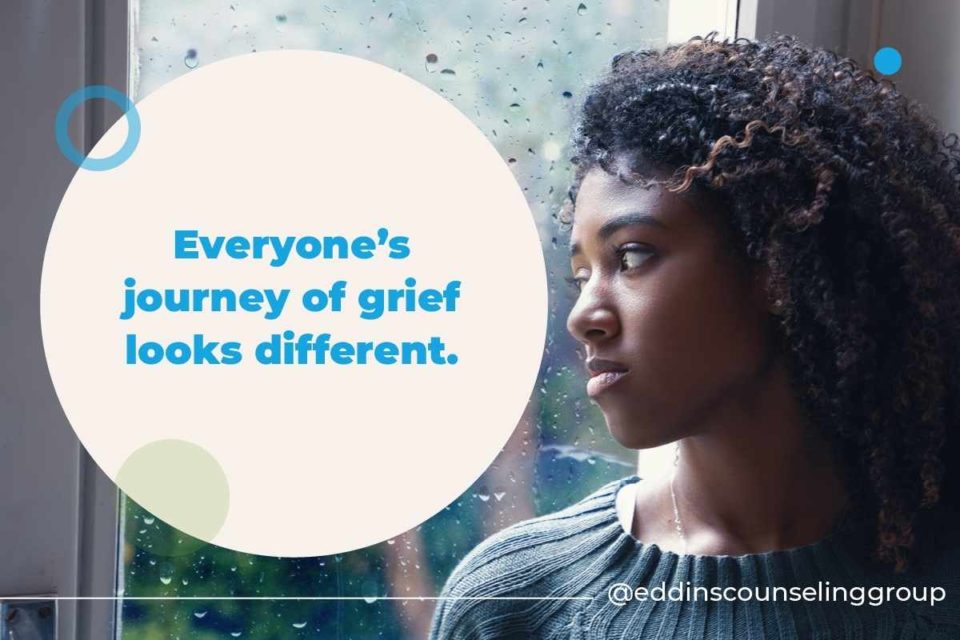
What Does Grief Look Like?
Everyone’s journey of grief looks different, and the ways someone chooses to grieve will be unique to their own path.
If your loved one is less apt to call you up and tell you how they feel, it may not mean that they don’t want to talk to you about their loss. More than likely, they are trying to cope with their grief in the only way they know how.
The 5 Stages of Grief
In 1969, Elisabeth Kubler-Ross created the step-by-step guide to understanding grief in her book On Death and Dying. In it, she discusses the five foundational aspects of grief that any person in mourning will experience.
These stages may occur in any order: however, they’re all likely to be deeply felt at some point during the process of grieving.
By understanding these stages, you can better support your loved one as they navigate their sorrow in the wake of their loss.
It is important to note that our goal as a supportive friend or family member is not to keep the grieving person from experiencing these stages. Rather, we want to support them by affirming that their emotions are valid.
These five stages are completely normal, and foundational to the grieving process. By giving your friend or family member space to experience these emotions with you in a safe environment, you can help them process their loss in a supportive way.
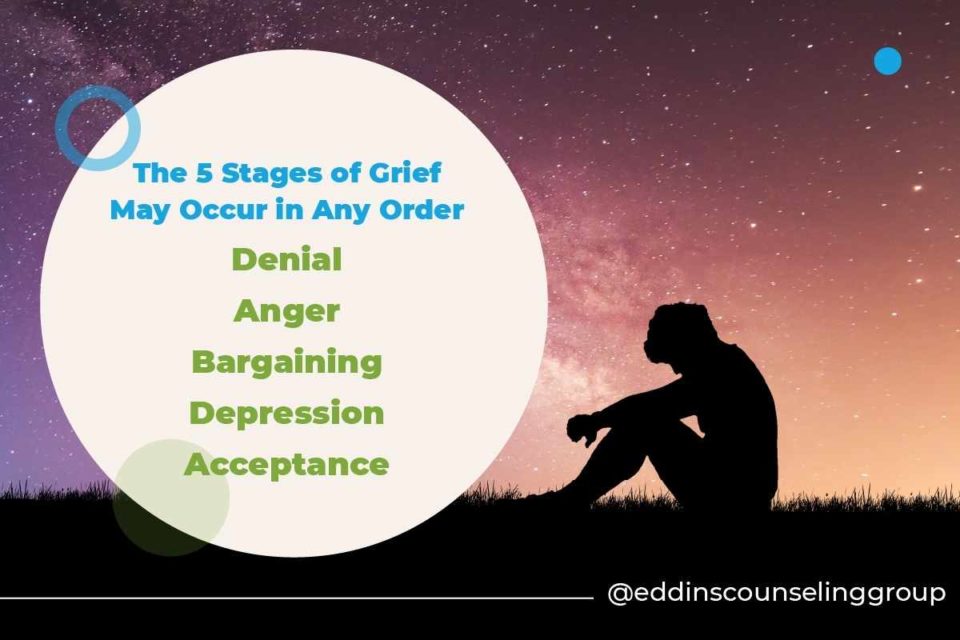
1. Denial
It can be hard to accept that something is truly gone. There are many implications to loss. Questions that can arise may be frightening to the person in mourning.
- How might life change with this loss?
- What if I can’t go on living my life the same way?
- Is life worth living if I don’t have…?
To avoid these difficult questions, sometimes it can be easier for the grieving person to keep from remembering the loss.
This doesn’t necessarily mean that the loss doesn’t affect them or that they aren’t sad. Simply, this is a way of protecting themselves from the enormity of the loss itself. It can feel like a sorrow too great to bear – thoughts and emotions that have to be shut down at all costs.
Denial can look and feel like:
- Avoidance of grief-related thoughts and conversations
- Procrastination on things related to the loss
- Forgetting important milestones (eg. death anniversaries, details of the loss, etc.)
- Being easily distracted
- Mindless behavior
- A driving need to be busy at all times
- “I’m fine/This is fine”
- Shock or disbelief
- Numbness
- Confusion
- Mentally and emotionally shutting down
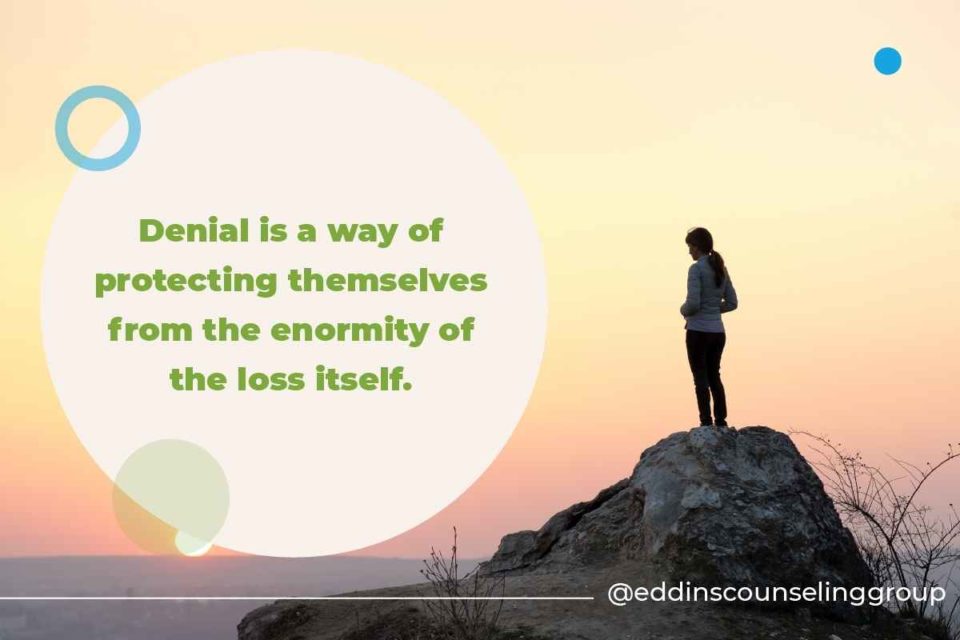
2. Anger
Though it can be intimidating to witness anger in your grieving loved one, this is a natural part of the grieving process. Anger is a way to express big emotions.
When someone is angry, they’re communicating that something is wrong. This anger can come out in many different ways.
It could be an anger directed towards the loss itself. Alternatively, they could be angry at their own actions or inactions regarding the loss – particularly if they experience guilt related to their grief.
It is important to note that this anger is normal. In fact, it can be an essential part of letting go and moving forward.
So how can you help someone experiencing anger in their grief?
Listening and supporting a grieving loved one in the anger stage can be difficult.
Listening to their thoughts and affirming their anger is an important step towards their recovery.
It can be heartbreaking for the mourning individual to experience anger – particularly if it’s related to a lost loved one. However, it’s important for the grieving person to be honest with their emotions.
Try not to judge how you feel about the loss. But rather, treat each emotion as a companion of grief. Emotions can’t be chosen. Therefore it is essential to acknowledge the fact that these feelings of grief and anger are out of our control.
Anger can look and feel like:
- Lasting sense of pessimism or cynicism
- Sarcastic comments about the loss or the mourning person’s role in it
- Frustration
- Resentment towards oneself or others
- Irritability (flying off the handle)
- Being aggressive or passive-aggressive towards themselves or others
- Frequent arguments or physical fights
- Impatience
- Rage
- Increased alcohol or drug use
- Embarrassment
- Feeling out of control
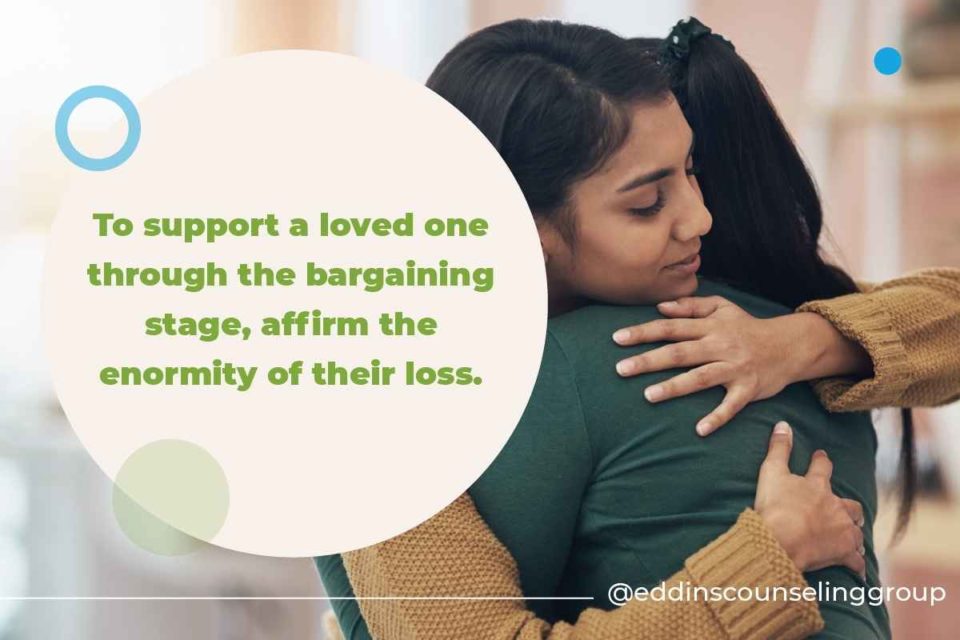
3. Bargaining
The term ‘bargaining’ refers to the desire to take back what has already been lost. This can surface in many ways, such as offering to help others in the name of the person who is lost, making donations, or even asking for a miracle.
Painful memories can surface during this stage, bringing regret or remorse with it.
To support a friend or loved one through the bargaining stage, affirm the enormity of their loss and the fact that life can feel overwhelming.
Bargaining can look and feel like:
- Ruminating on the past or a future without _______
- Feelings of guilt & blame
- Overthinking
- Worry, fear, & anxiety
- Trying to predict the future
- Fearing the worst about the future
- “I should have….”
- Strong judgment internally or externally
- Shame
- Insecurity
- “If only….”
- Perfectionism
- Comparing oneself to others
4. Depression
Sadness and depression may look very similar on the outside. They share similar symptoms of decreased interest in things you used to enjoy, feeling fatigued or lethargic, experiencing emotional pain, and appetite changes.
This is another essential stage of grief, and one that can’t be overlooked.
It can be difficult to see loved ones in pain. However, it is important to affirm their pain and emotions by listening to their grief and acknowledging their pain.
During the depression stage, it may be difficult for your loved one to care for their basic needs. Offering to cover chores, bringing meals, and helping with errands can all be tangible ways to show your support in this time of loss.
Depression can look or feel like:
- Sadness
- Changes in sleep patterns & appetite
- Low motivation
- Inability to complete daily tasks
- Hopelessness
- Despair
- Chronic sadness
- Frequent bouts of crying
- Feelings of helplessness or disappointment
- Increased drug or alcohol use
- Disappointment in oneself or others
- Staying away from social gatherings
- Feeling overwhelmed
- Lack of energy

5. Acceptance
Acceptance is known as the actualization stage: it’s a full circle of grief when the loss has been felt and accepted by the person in mourning.
While this doesn’t necessarily mean that the other stages won’t resurface, it implies that the person has processed the event and come to terms with the meaning of the loss.
Achieving the Acceptance stage also infers that the grieving person has fought through other difficult stages to acknowledge the full extent of the traumatic experience. They aren’t fighting or avoiding reality. Rather, they’ve accepted the loss and continue to move forward.
Everyone’s grief journey is different. Therefore, there is no length of time to suggest when someone should reach the Acceptance stage.
By taking one day at a time and allowing oneself to experience each emotion without judgment, the Acceptance will naturally follow in its own time.
Acceptance can look or feel like:
- Creating mindful behaviors & lifestyles
- Feeling “good enough”
- Being courageous post-loss
- Seeing the world as it is
- Being present in the moment
- Self-compassion
- Vulnerability & emotional tolerance
- Validation of oneself and others
- Adapting to situations with healthy coping mechanisms
- Wisdom
- Becoming assertive, non-defensive, & honest in communication
- “This is how things are, and I don’t have to change things I can’t control”
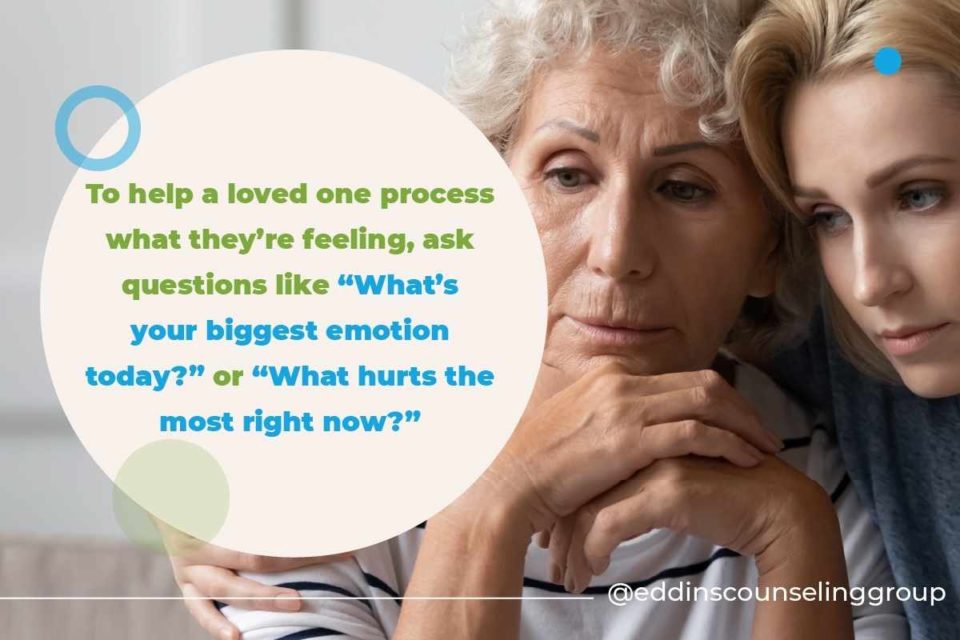
How to Partner in Grief with a Loved One
There are many ways to support a loved one in mourning. Here are some therapeutic ways you can be there for those you know are going through a tough time.
1. Offer to Listen
A great deal of the grieving process involves working through painful emotions, much like the ones listed above. Sadness, grief, anger, frustration, remorse, guilt, shame, and confusion are all just a snippet of the enormity of emotions many people experience when walking through a loss.
To help a loved one process what they’re feeling, ask questions like “What’s your biggest emotion today?” or “What hurts the most right now?” Be willing to listen to them without judgment.
As a support person, you want to see your loved ones thrive and move forward. Remember that they best way forward is through. Through pain. Through suffering. Through difficult conversations.
By being a safe person that encourages vulnerability, you can support your loved ones in a tangible way.
2. Be Willing to Reminisce
Depending on someone’s stage of grief, they may or may not be ready to share memories related to the loss. Being available to discuss stories, thoughts, and pictures with the grieving person is a great way to remind them that their loss matters.
It may be worrisome to approach nostalgic stories about the loss because you don’t want to make the grieving person sad or remind them of their loss. Oftentimes, those in mourning are already remembering their loss.
Having a supportive person to reminisce with can be very cathartic. It can help them express their thoughts and feelings about what they lost. In fact, remembering a loved one or way of life can be a way to affirm that their loss matters.
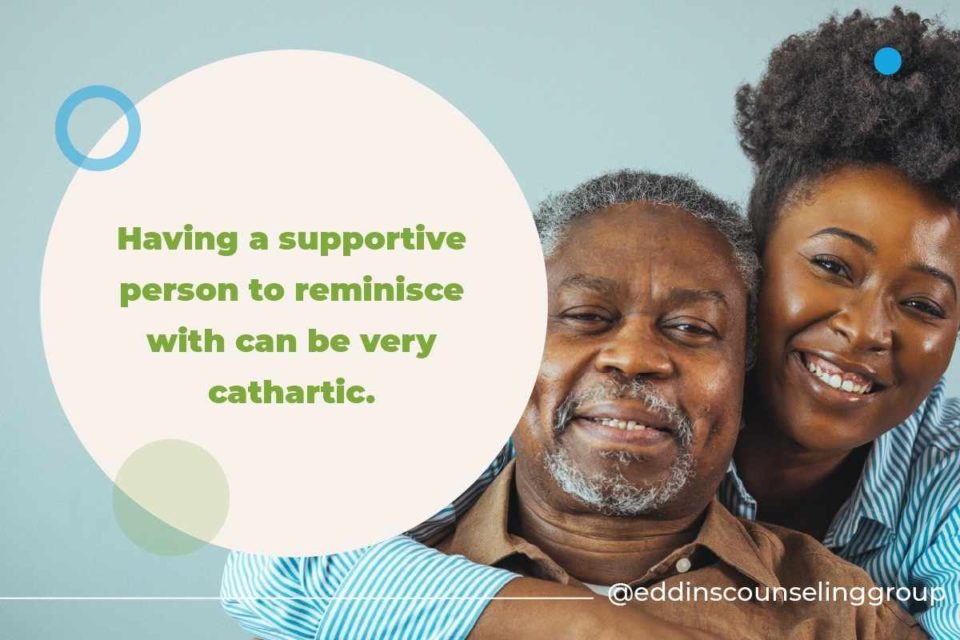
3. Affirm their Pain
Whether the person you care for is experiencing grief, anger, sadness, shame, or any feeling in between, that’s normal. Be sure to let them know that you are there for them, and want to support them in their grief journey.
If you hear the person shaming themselves for having difficult emotions like anger or shame, be sure to remind them that feelings come and go – we can’t control them. Let them experience them without judging themselves for the feelings they experience.
As always, thank you for being there to listen.
4. Become a Superhero
At a funeral, many people may come up to the ones in mourning and say something like, “I’m so sorry for your loss. Let us know if you need anything.”
Instead of leaving things open ended, try to give specific ways you can help.
- Have a knack for baking or cooking? Offer to drop by with a meal or dessert later this week.
- Do you have a quiet or scenic space you can share? Give them an invitation to come use a cabin or other resource to grieve.
- Enjoy taking care of the little things? Ask them if they could benefit from a week or weekend visit to help them get caught up on things around the house.
No matter what you can give, just the offer of assistance can communicate volumes to those experiencing loss.
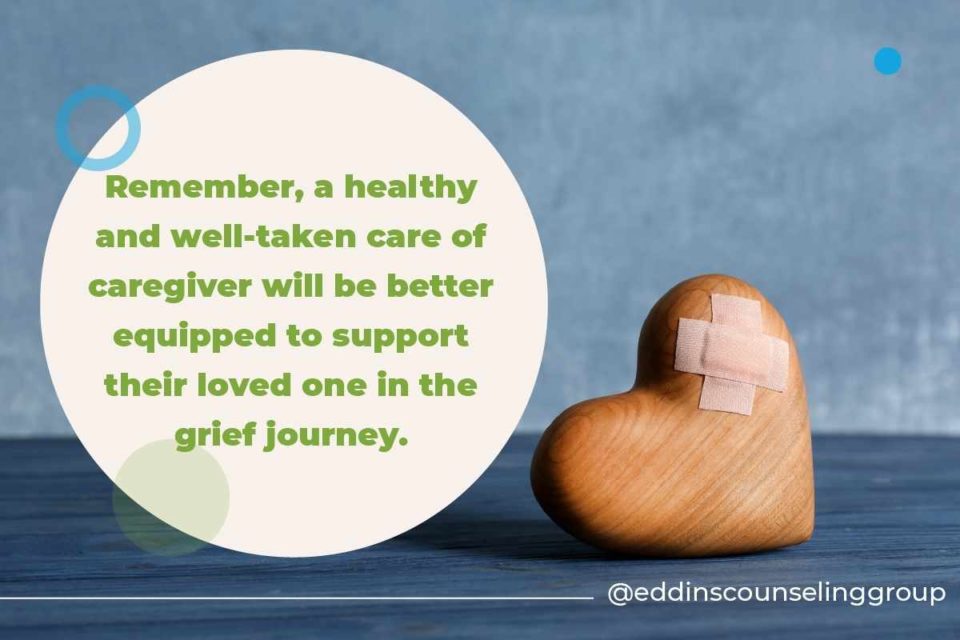
5. Unconditional Love & Patience
The journey of grief is long and tumultuous. Don’t be afraid to go through difficult times with your loved one as you walk through the various stages of grief.
Through it all, remember to give yourself love and patience. Practice self care, and be sure to make time for yourself. Remember, a healthy and well-taken care of caregiver will be better equipped to support their loved one in the grief journey.
You’re not alone. Don’t forget to take care of yourself as well!
Find Support
If you or someone you know is struggling with a loss and would benefit from having a trained grief expert to walk you through this time, feel free to reach out to us today at Eddins Counseling Group.
One of our friendly client care coordinators will set you up with your first appointment with one of our Houston, Montrose, or Sugar Land therapists so you can get back living life and moving forward.
We’re here to help you and your family through all of the ups and downs of life.

Posts You Might Also Find Helpful:
Grounding & Self Soothing
Get instant access to your free ebook.
















